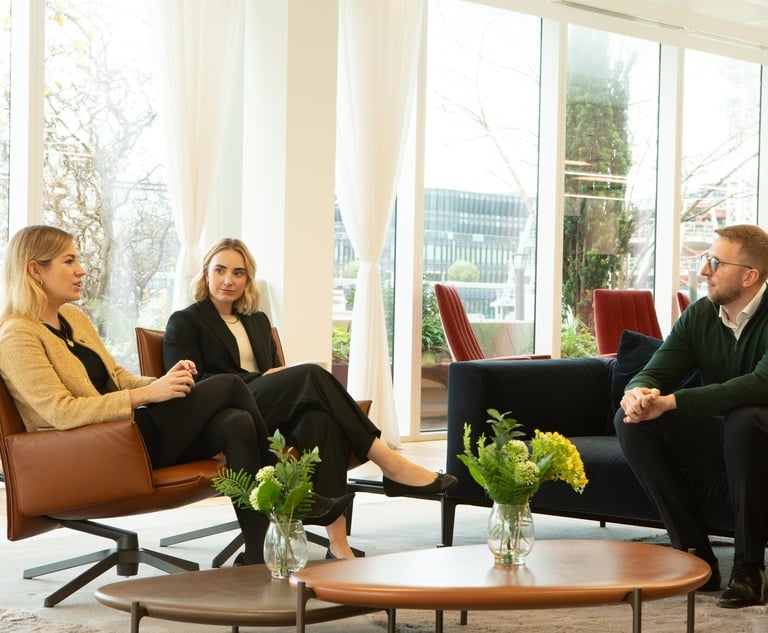Billable-Hour Model Hurts Women's Careers, Say Female Lawyers
On this International Women's Day, female lawyers say the billable hours model is stifling careers and penalising their gender.
March 08, 2019 at 05:15 AM
8 minute read
The billable-hour model has been placed under a lot of scrutiny in recent years, with many clients and some law firms looking to move away from the traditional model in favour of alternative flat-fee arrangements.
But with the vast majority of firms still relying on billed hours to invoice their clients or just to measure internal performance, the verdict from some women in the City is that the model doesn't work as well for their careers as it does for men's.
Many female lawyers say they are disproportionately affected by the huge pressure to hit billable-hours targets, build a book of business and spend time with the family. And there is widespread pessimism over whether that will change while there are too few women in senior positions.
The topic is so sensitive that many on both sides of the debate will only speak on condition of anonymity, but Legal Week spoke with a dozen senior legal executives to get their views.
"Men are never going to get rid of billable hours because it works for them"
One female corporate partner says: "This discussion is about more than just work-life balance – it's actually hitting our compensation."
Another, working in the London office of a U.S. firm, adds: "This is a male-dominated industry, and men are never going to get rid of billable hours because it works for them."
Many lawyers – both men and women – say they think the billable-hour model is no longer the best way to calculate their value to a firm, though they admit that they don't expect to see huge changes to billable-hour targets in the short to medium term.
A female partner at a U.S. firm says: "The chargeable hour is still the primary way in which firms remunerate their people. I think if you talk to any woman who has had a baby, she will tell you that she's become more efficient since having children, but that doesn't necessarily translate into more chargeable hours."
"The issue with that is that in a law firm structure, it's a detriment to yourself to be efficient"
"A woman's approach to things tends to be very efficient," says another. "It's not that men are not efficient, but it's just that women tend to pack a lot more into a day and maybe that is because they have other responsibilities or feel that they need to be out of the door by a certain time. But the issue with that is that in a law firm structure, it's a detriment to yourself to be efficient."
Three senior female partners say they have had to remind younger women in their firms to bill all of the hours they are working, with one partner saying that their female associates "don't tend to record as much as men".
Another says: "Give the same job to a man and a woman and the man will bill an awful lot more."
Not everyone agrees it is so clear cut. Paul Dolman, head of private equity at Travers Smith, says: "Is there a differential between men and women? I haven't seen it. I have seen some very efficient women, some inefficient women, some very efficient men, and some inefficient men. I don't think you can generalise this as with regards to someone being male or female. I think it's a wider issue than that, which is why billable targets are a crude tool to measure efficiency.
"I do think that traditionally women have had competing demands for their time around their families and their job. That can apply equally to men, but I guess if you look around, it impacts women more. I think that is absolutely true. We have a lot of people, both men and women, who go home and log on (to continue working) later that night."
A senior female lawyer adds: "I think, culturally speaking, I can see that (the billable-hour model) encourages people to work long hours and that can be challenging for a woman when you're raising a family, but I don't necessarily buy the idea that women are more efficient than men. I think that's a generalisation."
"Both men and women have to accept that they're going to miss parties and the theatre and they'll need to organise childcare"
And a male partner at a US law firm says: "Even if we have another metric of how we'd bill the clients, that doesn't mean you would work less hard, you'd still be flat out because we charge a lot of money for our services. Both men and women have to accept that they're going to miss parties and the theatre and they'll need to organise childcare.
"You can't say it is one rule for women and another for men – if they don't have the same targets is it right that they're being paid the same?"
Law firms have been pushing to improve their flexible and agile working initiatives in recent years, in a bid to retain female talent throughout the ranks.
Catch-22
Dana Denis-Smith, chief executive and founder of flexible-working law firm Obelisk Support, says: "Men are happier to be in the office for longer and the workload ends up being unevenly distributed, which traps women into limited decision-making. If you can't get the bonus, then it limits what you are able to achieve further down the line – it's a Catch-22 situation."
"Women don't self-select out of law firms. The working arrangements that are on offer do not work for them"
She adds: "Women don't self-select out of law firms. The working arrangements that are on offer do not work for them. If a woman opts to be a mother, that doesn't mean that she opts out of the workplace. If a woman chooses to put her family first, that's her choice."
Nearly all lawyers spoken to for this piece agree that agile working is good for retention, as it allows people to work remotely and log back on later in the evening when their family-oriented schedule is more convenient.
Men, particularly those of millennial age, are taking a different view to their seniors and are aligning with female colleagues with the view that it should be acceptable to leave work early to be with their family, they say. For many female lawyers, this could be a game-changer.
"It's incredibly helpful," says one woman. "The more you have people who have children and want to spend as much time as possible with them, or simply anyone who just wants a life outside work, the better things will be for everyone."
Another adds that men applying for longer paternity periods "levels the playing field – if everybody were to be out for a certain amount of time that would really change perceptions".
'I'm struggling to bill that much'
A female private equity partner working at a U.S. firm in London points out that having so few women in senior roles at the firm leads younger female lawyers to believe it is impossible to progress through the ranks while raising a family.
She says: "I think that one of the big problems is that it just feels awful to have to bill so many hours. You think: 'I'm struggling to bill that much now, I'm never going to be able to do that when I have kids.' Unless you have somebody ahead of you who has done it, or is doing it, and they can say to you: 'Look, this is how you can make it work because I've done it', people count themselves out."
"The problem is when you are having children in your 30s and then raising them into your 40s, that critical time of career progression is the time that you're pulled most towards home"
Natasha Harrison, London managing partner of Boies Schiller Flexner, says: "It takes time for these things to change, you've got to raise a generation through it. There aren't many women running offices or in senior equity and board positions. The problem is when you are having children in your 30s and then raising them into your 40s, that critical time of career progression is the time that you're pulled most towards home."
Another female lawyer adds: "I think as firms increase the number of women in those types of senior roles, they'll naturally improve their retention at more junior levels."
Overwhelmingly, female lawyers say the only way to really bring about change on both diversity and billable-hour issues is for the clients to push it through.
"It's a two-way process," says one woman. "I think firms are a lot more introspective now, but if the clients also push forward with it on their agenda there's much more chance of change coming through faster."
This content has been archived. It is available through our partners, LexisNexis® and Bloomberg Law.
To view this content, please continue to their sites.
Not a Lexis Subscriber?
Subscribe Now
Not a Bloomberg Law Subscriber?
Subscribe Now
NOT FOR REPRINT
© 2025 ALM Global, LLC, All Rights Reserved. Request academic re-use from www.copyright.com. All other uses, submit a request to [email protected]. For more information visit Asset & Logo Licensing.
You Might Like
View All
Paul Weiss Says Progress Means 'Embracing the Uncomfortable Reality'
5 minute read

GCs Say They are Getting 'Edged Out' of UK Boardrooms
Trending Stories
- 1California Lawmakers Reach $50M Deal to Fund Legal Fights Against Trump
- 2Supreme Court Wrestles With Disabled Ex-Firefighter's Discrimination Case
- 3NJ Firm Narrowly Avoids Case Dismissal Over Lengthy Complaint Filed in Fed Court
- 4Arbitrators Under Fire for Allegedly Forcing Workers to 'Stay or Pay' Employers
- 5Plaintiff Narrowly Avoids Dismissal Over Lengthy Complaint Filed in Federal Court
Who Got The Work
Michael G. Bongiorno, Andrew Scott Dulberg and Elizabeth E. Driscoll from Wilmer Cutler Pickering Hale and Dorr have stepped in to represent Symbotic Inc., an A.I.-enabled technology platform that focuses on increasing supply chain efficiency, and other defendants in a pending shareholder derivative lawsuit. The case, filed Oct. 2 in Massachusetts District Court by the Brown Law Firm on behalf of Stephen Austen, accuses certain officers and directors of misleading investors in regard to Symbotic's potential for margin growth by failing to disclose that the company was not equipped to timely deploy its systems or manage expenses through project delays. The case, assigned to U.S. District Judge Nathaniel M. Gorton, is 1:24-cv-12522, Austen v. Cohen et al.
Who Got The Work
Edmund Polubinski and Marie Killmond of Davis Polk & Wardwell have entered appearances for data platform software development company MongoDB and other defendants in a pending shareholder derivative lawsuit. The action, filed Oct. 7 in New York Southern District Court by the Brown Law Firm, accuses the company's directors and/or officers of falsely expressing confidence in the company’s restructuring of its sales incentive plan and downplaying the severity of decreases in its upfront commitments. The case is 1:24-cv-07594, Roy v. Ittycheria et al.
Who Got The Work
Amy O. Bruchs and Kurt F. Ellison of Michael Best & Friedrich have entered appearances for Epic Systems Corp. in a pending employment discrimination lawsuit. The suit was filed Sept. 7 in Wisconsin Western District Court by Levine Eisberner LLC and Siri & Glimstad on behalf of a project manager who claims that he was wrongfully terminated after applying for a religious exemption to the defendant's COVID-19 vaccine mandate. The case, assigned to U.S. Magistrate Judge Anita Marie Boor, is 3:24-cv-00630, Secker, Nathan v. Epic Systems Corporation.
Who Got The Work
David X. Sullivan, Thomas J. Finn and Gregory A. Hall from McCarter & English have entered appearances for Sunrun Installation Services in a pending civil rights lawsuit. The complaint was filed Sept. 4 in Connecticut District Court by attorney Robert M. Berke on behalf of former employee George Edward Steins, who was arrested and charged with employing an unregistered home improvement salesperson. The complaint alleges that had Sunrun informed the Connecticut Department of Consumer Protection that the plaintiff's employment had ended in 2017 and that he no longer held Sunrun's home improvement contractor license, he would not have been hit with charges, which were dismissed in May 2024. The case, assigned to U.S. District Judge Jeffrey A. Meyer, is 3:24-cv-01423, Steins v. Sunrun, Inc. et al.
Who Got The Work
Greenberg Traurig shareholder Joshua L. Raskin has entered an appearance for boohoo.com UK Ltd. in a pending patent infringement lawsuit. The suit, filed Sept. 3 in Texas Eastern District Court by Rozier Hardt McDonough on behalf of Alto Dynamics, asserts five patents related to an online shopping platform. The case, assigned to U.S. District Judge Rodney Gilstrap, is 2:24-cv-00719, Alto Dynamics, LLC v. boohoo.com UK Limited.
Featured Firms
Law Offices of Gary Martin Hays & Associates, P.C.
(470) 294-1674
Law Offices of Mark E. Salomone
(857) 444-6468
Smith & Hassler
(713) 739-1250










